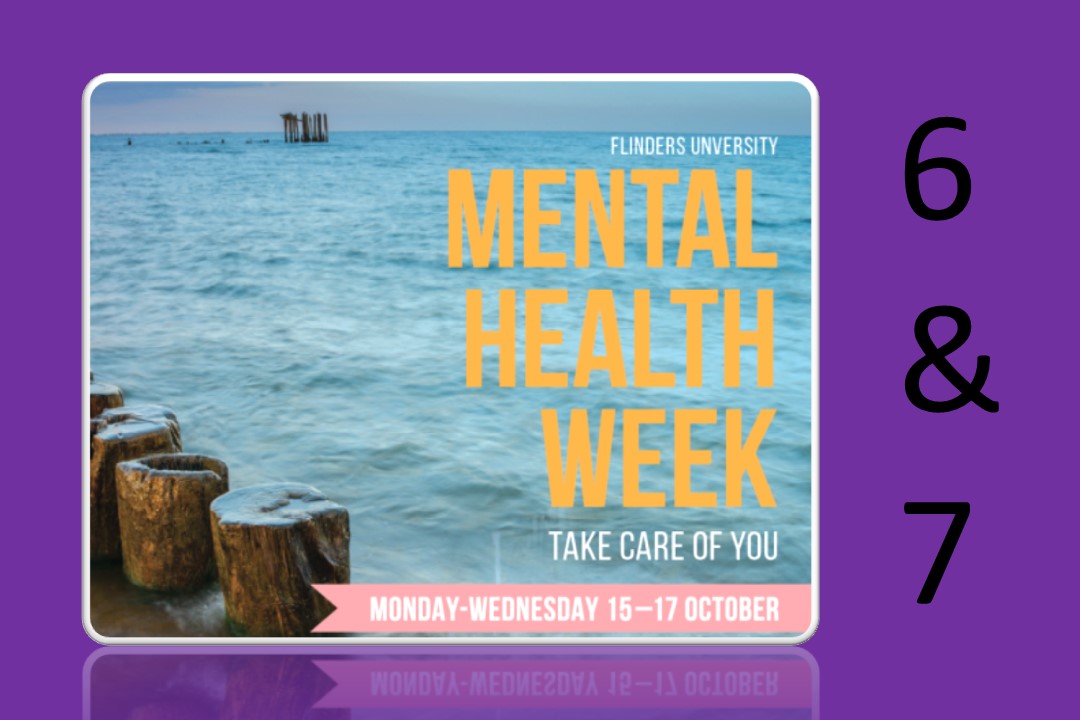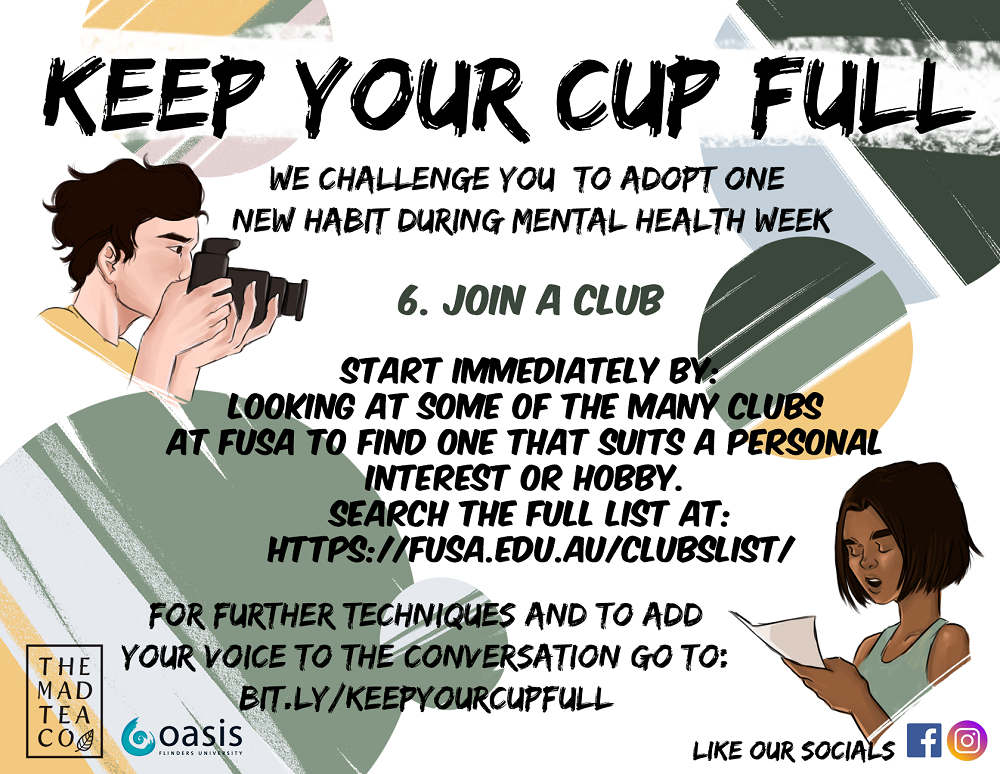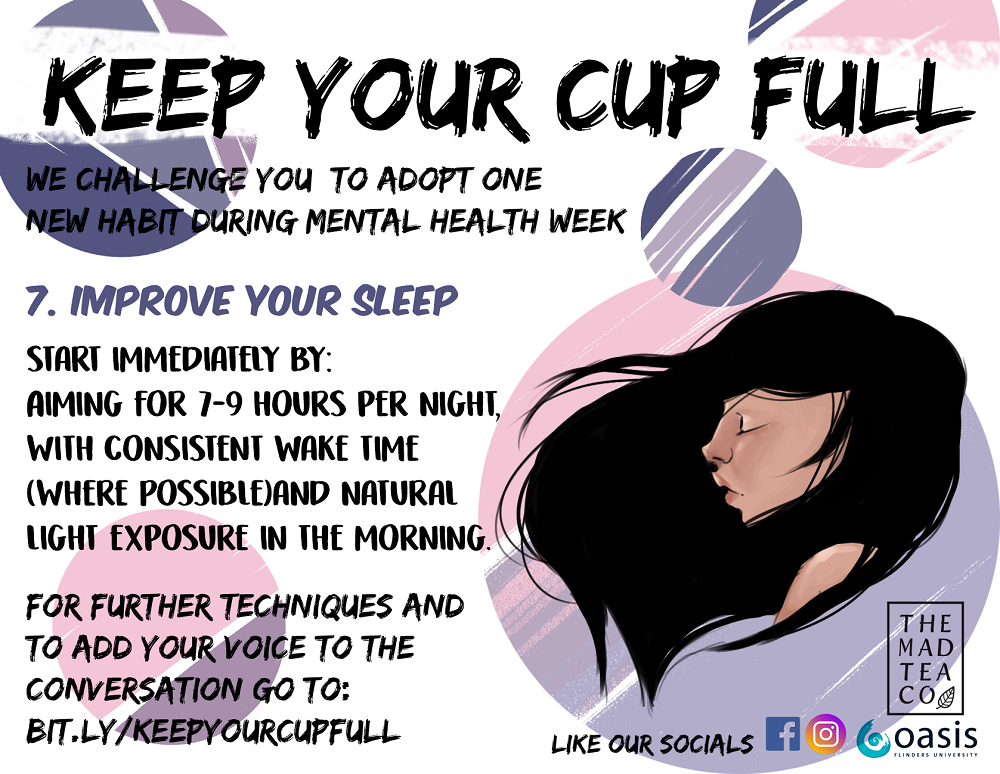
My bad.
I didn’t actually post these over the weekend, like I should have.
But I was happily playing around in the dirt in my garden, digging some things up and planting other things (time in nature – challenge #2).
But better late than never! Here are the two final Mental Health Week ‘Keep Your Cup Full‘ challenges.
The first is about increasing your social network. The second is about getting better sleep. Let’s explore them both.
Join a club
Loneliness is one of the biggest threats to student wellbeing.
This is because a sense of ‘belonging’ is a fundamental human need. We derive a significant portion of our self-identity from the groups that we are part of. If we are socially isolated and not part of a ‘group’, this is a major challenge to our sense of self.
Belonging can include many different groups: family, friends, clubs, classes, online forums etc. It is not necessary to feel part of lots of different groups, but just enough to feel valued, wanted and secure.
For many tertiary students, it is easy to become socially isolated. You might be studying aware from home (e.g. international students), or you might be very busy and have little time to devote to social time (e.g. working parent). Whatever the reason, it is easy to get ‘lost’ in the big system that is a university.
If this is you and you feel disconnected, there is at least one thing in your favour. Universities are great places to meet new people!
Your starting point is clubs and societies. Honestly, there is a club for just about every interest, topic, course, college.
Check first whether there are any social groups attached to your degree or college. This is a good way to meet new people, but also enhance your learning. If not, go with something more hobbies or interests based.
If self-development is something you are interested in, try the Horizon Awards Program. You can better yourself, improve career prospects and meet like-minded people at the same time.
Finally, spend some time at OASIS. OASIS is a community centre located on the Bedford Park Campus. There are always programs and things going on there.
But I am socially awkward!
First, you probably aren’t as awkward as you think. Yes, you might be a little quirky or strange, but so are lots of other people. It might take some trial and error to find a setting in which you thrive, but stick with it. Don’t be put off if your early attempts don’t go so well, or the first groups you attend aren’t quite up to your expectations. Rinse and repeat.
Second, the basics of social interaction aren’t super complex. If you are joining a group, make sure you remember a few people’s names. Ask them a few question. Listen carefully to their answers. Be upfront about what you’d like to get from the group (focus on the purpose of the group, not your isolation). Ask what you can do to help out. The goal is not to make yourself likeable, but instead to make yourself useful and get to know the other people. Focus on learning about others and the group.
Friendships take a while to build
Remember that friendships take a while to build. You might be ‘in the market’ for a best friend, but this will take time and can’t really be rushed or forced.
Take comfort in the fact that if you start participating more in groups and social settings, that those friendships will emerge.

Get better sleep
Admittedly, if I am given the options of a) hang out with people or b) sleep, I am a little ashamed to say I generally pick option b.
I justify it by reminding people of all the benefits of sleep in terms of learning, memory, metabolism, and mood.
Sleep gets mentioned a reasonable amount on the blog. This is because students tend to get poor sleep, even though sleep is a genuine cognitive enhancer.
The ingredients of good sleep (like social interaction) aren’t super complex.
Try to aim for the following:
- wake up at the same time each day (helps set your body clock)
- attempt to get sunlight exposure in the first few hours of having woken up
- reduce light levels from all devices in the hours before sleep
- focus specifically on reducing sources of stress during the day
- remind yourself that waking up during the night is normal
If you suspect you have some kind of sleep issue (e.g. insomnia), speak to your GP. Another option is to talk to the Flinders Insomnia Clinic. They treat individuals of any age with insomnia and circadian rhythm disorders. To learn more, email them on casc.enquiries@flinders.edu.au or call them on 8201 7587.


